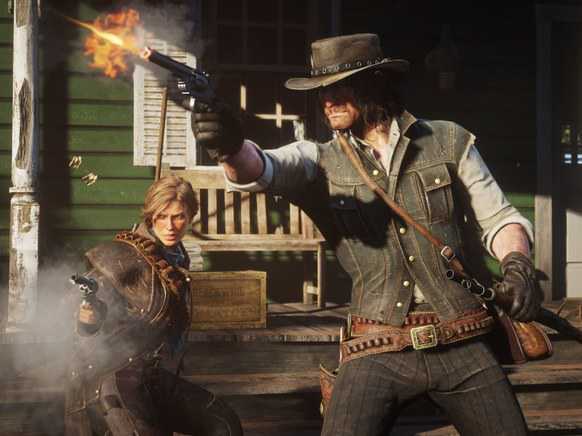Red dead redemption 2 is too big for just one review

OF MY FIRST twenty-odd hours with Red Dead Redemption 2, one of the moments I remember most is sitting. Just sitting.
After riding my horse to some unmarked destination in the wilderness, I—as my character, grizzled cowboy Arthur Morgan—found myself on a high ridge, with a pointed overlook stretching out over the valley beneath. The clouds were thick and ridged, detailed and lush. The sky looked like rain might be coming. It was stunning, so evocative of real life in the rural places in the South and West that I couldn't, for a moment, think of anything else. So I sat.
A massive sequel to a massive cowboy tragedy, Red Dead Redemption 2 is a Rockstar Games project that many people have been anticipating for a very long time. Technically a prequel, it follows a gang of outlaws in the Wild West in the late 1800s, as the frontier threatens to collapse into bitter reality, and as these people begin to realize that their time probably ran out a decade ago. The West is a hard setting to get right, because to do so is to contrast its fundamental appeal to the white American consciousness-—the lure of freedom, and land, and adventure–with the reality that most of these promises were lies. That land belonged to other people, and the path to Manifest Destiny was paved with violence and theft, and even at its most innocent was dangerous and fraught in incredibly mundane ways.
But from my early experience, the sprawling and elegiac Red Dead Redemption 2 might be the rare Western-themed game engaged with unraveling some of those lies, and in doing so truly engaging with the setting.
Arthur and his gang are on the run, and things aren't going well, and there's a creeping sense of realization through those early hours, like two sketch comedians in costume looking at the markings on their hats and realizing that, maybe, they're the baddies after all. This unease permeates the play experience, which slows down the normal open-world mayhem of Rockstar's games to something deliberate, clumsy, almost anxious. Nothing is easy or responsive in Red Dead Redemption 2. Thematically, that seems right.
But playing Red Dead Redemption 2 has another creeping dread, one that has nothing to do with the thematics of the story. A recent Kotaku expose have revealed stark information about Rockstar's working conditions during the creation of this game(and, likely, many of their others): long, brutal work weeks; limited time off; an abiding pressure to participate in a culture of overwork that people in games call "crunch." There's no need to mince words about this: Red Dead Redemption 2 was built on the suffering and exhaustion of many of the people who created it. Many in the videogame community are rightly calling this labor abuse, and suggest, not unfairly, that perhaps any game made this way doesn't deserve any attention at all.
The easy thing to do for a writer in this situation would be to attempt to draw some sort of connection between the conditions of the game and its narrative, to point out the thematic parallels between cowboys running on fumes and workers running on same, between the capitalists and the cops that are so far occupying the role of the game's villains and the managers and bosses who imposed harsh labor conditions. Those parallels might even exist.
The ugly truth is that abusive conditions can create terrible art. They can also create brilliant, humanistic art. Great art does not require suffering, but it sometimes gets it anyway.
But that gesture also belies the messiness of the situation. The ugly truth is that abusive conditions can create terrible art. They can also create brilliant, humanistic art. Great art does not require suffering, but it sometimes gets it anyway. There's no clear line here, one way or another, between pain and creativity. It's harder than that. And acknowledging crunch here means acknowledging the brutality of labor conditions across the entire industry, and in our modern lives in general. Rejecting Red Dead Redemption 2 might be, at the end of the day, a moral necessity, or it might be an empty gesture of consumerist intent that, by itself, doesn't actually help anyone. It's hard to say for sure.
Here's what I know, after playing some, but not all, of Red Dead Redemption 2: it might be a brilliant videogame. And I also know it might not be worth playing at all, due to how it was made.
I'm going to keep going in Red Dead Redemption 2. I'm going to ride into the thick brush of the game's unease and beauty. I know already I'm not going to find any answers in there. But I've got a job to do. And the lies of the frontier have a seductive sound.
Source: https://www.wired.com